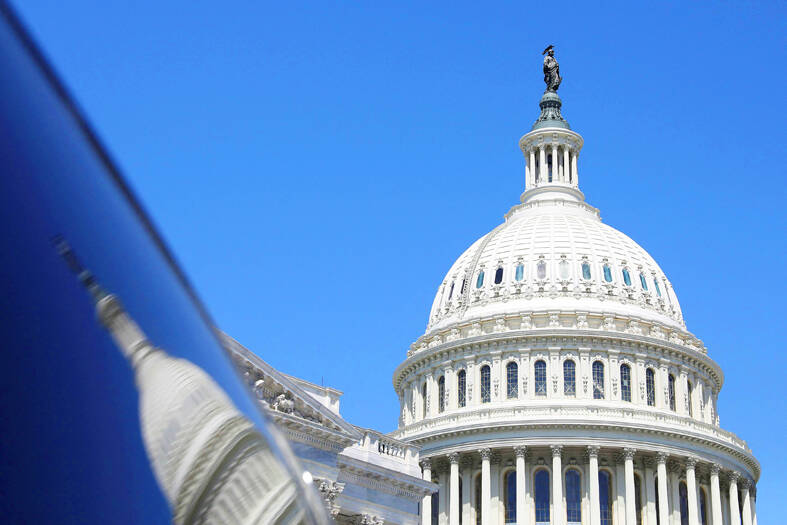US representatives have introduced a bipartisan Taiwan Peace Through Strength Act to promote peace through strength in Taiwan, as well as expedite and prioritize US military sales to the nation.
US representatives Chris Pappas, a Democrat, and Jim Banks, a Republican, on Friday last week proposed the House’s version of the bill, following the US Senate’s version proposed by US Senator Marco Rubio on June 14.
The bill proposes “to reinforce our nation’s support of Taiwan as the island faces the increased threat of a Chinese Communist Party military attack,” a press release issued by Pappas’ office said.

Photo: Reuters
“This legislation would prioritize Taiwan’s resiliency in the face of potential conflicts and expedite the delivery of much-needed resources to ensure they have the capability to defend themselves effectively,” Pappas was quoted as saying.
Chinese President Xi Jinping’s (習近平) “extreme rhetoric makes it clear that lawmakers in Washington must act now to deter a Chinese invasion,” Banks said.
“Make no mistake: deterring an invasion of Taiwan must be our top priority,” Rubio said.
While the text of the proposed bill is not yet available, it would expedite and prioritize US military sales to Taiwan; establish regular combined US-Taiwan exercises, training and professional exchanges; and establish a Taiwan Critical Munitions Acquisition Fund, the press release said.
The proposed bill also clarifies that US authorities would arm Taiwan as per the Taiwan Relations Act, it added.
The US Senate’s version of the act makes amendments to the Taiwan Relations Act, allowing the US to provide “arms conducive to the deterrence of acts of aggression by the People’s Liberation Army” to Taiwan, not just “arms of a defensive character.”
The US would provide Taiwan with defense articles and defense services that allow Taiwan to “implement a strategy to deter acts of aggression by the People’s Liberation Army and to deny an invasion of Taiwan by the People’s Liberation Army,” instead of maintaining “a sufficient self-defense capability,” the proposed bill says.
The Senate’s version preclears and prioritizes military platforms, technologies, and equipment for sale and release to Taiwan through the Foreign Military Sales program.
Contractors awarded US Department of Defense contracts to provide items for such sales to Taiwan are required to expedite and prioritize the production of the items regardless of the order in which contracts were signed, the proposed bill says.
These contractors are forbidden from conducting any business in China, or with any entity that is owned by or controlled by the Chinese government or the Chinese Communist Party, or any subsidiary of such a company, it says.
The US secretary of defense should establish a high-level military planning mechanism between the US and Taiwan to oversee a joint exercise program, and coordinate military education and training exchanges, it says.
The mechanism aims to coordinate the capabilities of military forces in the US and Taiwan “to address the needs of currently anticipated and future contingencies,” it says.
The US government is required to transfer up to US$2 billion a year to the Taiwan Critical Munitions Acquisition Fund to ensure that the US’ allies and partners have adequate stocks of critical munitions in advance of a potential operation to defend Taiwan, it says.

The Ministry of Foreign Affairs (MOFA) yesterday said it is closely monitoring developments in Venezuela, and would continue to cooperate with democratic allies and work together for regional and global security, stability, and prosperity. The remarks came after the US on Saturday launched a series of airstrikes in Venezuela and kidnapped Venezuelan President Nicolas Maduro, who was later flown to New York along with his wife. The pair face US charges related to drug trafficking and alleged cooperation with gangs designated as terrorist organizations. Maduro has denied the allegations. The ministry said that it is closely monitoring the political and economic situation

Conflict with Taiwan could leave China with “massive economic disruption, catastrophic military losses, significant social unrest, and devastating sanctions,” a US think tank said in a report released on Monday. The German Marshall Fund released a report titled If China Attacks Taiwan: The Consequences for China of “Minor Conflict” and “Major War” Scenarios. The report details the “massive” economic, military, social and international costs to China in the event of a minor conflict or major war with Taiwan, estimating that the Chinese People’s Liberation Army (PLA) could sustain losses of more than half of its active-duty ground forces, including 100,000 troops. Understanding Chinese

UNRELENTING: China attempted cyberattacks on Taiwan’s critical infrastructure 2.63 million times per day last year, up from 1.23 million in 2023, the NSB said China’s cyberarmy has long engaged in cyberattacks against Taiwan’s critical infrastructure, employing diverse and evolving tactics, the National Security Bureau (NSB) said yesterday, adding that cyberattacks on critical energy infrastructure last year increased 10-fold compared with the previous year. The NSB yesterday released a report titled Analysis on China’s Cyber Threats to Taiwan’s Critical Infrastructure in 2025, outlining the number of cyberattacks, major tactics and hacker groups. Taiwan’s national intelligence community identified a large number of cybersecurity incidents last year, the bureau said in a statement. China’s cyberarmy last year launched an average of 2.63 million intrusion attempts per day targeting Taiwan’s critical

‘SLICING METHOD’: In the event of a blockade, the China Coast Guard would intercept Taiwanese ships while its navy would seek to deter foreign intervention China’s military drills around Taiwan this week signaled potential strategies to cut the nation off from energy supplies and foreign military assistance, a US think tank report said. The Chinese People’s Liberation Army (PLA) conducted what it called “Justice Mission 2025” exercises from Monday to Tuesday in five maritime zones and airspace around Taiwan, calling them a warning to “Taiwanese independence” forces. In a report released on Wednesday, the Institute for the Study of War said the exercises effectively simulated blocking shipping routes to major port cities, including Kaohsiung, Keelung and Hualien. Taiwan would be highly vulnerable under such a blockade, because it